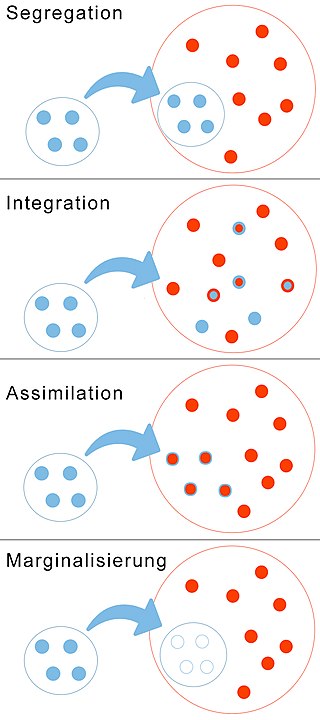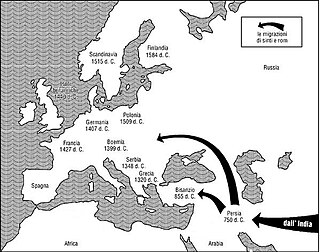
David Frawley is an American author, astrologer, teacher (acharya) and a proponent of Hindutva.

Acculturation is a process of social, psychological, and cultural change that stems from the balancing of two cultures while adapting to the prevailing culture of the society. Acculturation is a process in which an individual adopts, acquires and adjusts to a new cultural environment as a result of being placed into a new culture, or when another culture is brought to someone. Individuals of a differing culture try to incorporate themselves into the new more prevalent culture by participating in aspects of the more prevalent culture, such as their traditions, but still hold onto their original cultural values and traditions. The effects of acculturation can be seen at multiple levels in both the devotee of the prevailing culture and those who are assimilating into the culture.
A backlash is a strong adverse reaction to an idea, action, or object. It is usually a reflection of a normative resentment rather than a denial of its existence. In Western identitarian political discourse, the term is commonly applied to instances of bias and discrimination against marginalized groups. In this form of discourse, backlash can be explained as the response- or counter reaction- to efforts of social progress made by a group to gain access to rights.

Forced assimilation is an involuntary process of cultural assimilation of religious or ethnic minority groups during which they are forced to adopt language, national identity, norms, mores, customs, traditions, values, mentality, perceptions, way of life, and often religion and ideology of established and generally larger community belonging to dominant culture by government. Also enforcement of a new language in legislation, education, literature, worshiping counts as forced assimilation. Unlike ethnic cleansing, the local population is not outright destroyed and may or may not be forced to leave a certain area. Instead the assimilation of the population is made mandatory. This is also called mandatory assimilation by scholars who study genocide and nationalism. Mandatory assimilation has sometimes been made a policy of new or contested nations, often during or in the aftermath of a war. Some examples are both the German and French forced assimilation in the provinces Alsace and Lorraine, and some decades after the Swedish conquests of the Danish provinces Scania, Blekinge and Halland the local population was submitted to forced assimilation, or even the forced assimilation of ethnic Teochews in Bangkok by the Siam government during World War I until the 1973 uprising.
FrontPage Magazine, also known as FrontPageMag.com, is an American political website edited by David Horowitz and published by the David Horowitz Freedom Center. It has been described by scholars and writers as right-wing, far-right, and Islamophobic.
Charles Wade Mills was a philosopher who was a professor at Graduate Center, CUNY, and Northwestern University. Born in London, Mills grew up in Jamaica and later became a United States citizen. He was educated at the University of the West Indies and the University of Toronto.
In sociology, racialization or ethnicization is a political process of ascribing ethnic or racial identities to a relationship, social practice, or group that did not identify itself as such. Racialization or ethnicization often arises out of the interaction of a group with a group that it dominates and ascribes a racial identity for the purpose of distinguishing dominant group's identity as comparatively different from the nondominant group, and for continuing/reproducing domination and social exclusion. Over time, the racialized and ethnicized group develop the society enforced construct that races are real, different and unequal in ways that matter to economic, political and social life, an unhealthy norm that strips them from their dignity of a full humanity. This systemic tool in varying flexibility have been commonly used throughout the history of imperialism, nationalism, racial and ethnic hierarchies.

Šuto Orizari, often shortened as Šutka, is a neighbourhood in the City of Skopje, North Macedonia, and the seat of Šuto Orizari Municipality. It is often regarded as the cultural capital of the Romani people in North Macedonia. An independent Romanistan was proposed here in the early 1990s by leaders of the Party for the Complete Emancipation of Roma.
Social integration is the process during which newcomers or minorities are incorporated into the social structure of the host society.
Internalized racism is a form of internalized oppression, defined by sociologist Karen D. Pyke as the "internalization of racial oppression by the racially subordinated." In her study The Psychology of Racism, Robin Nicole Johnson emphasizes that internalized racism involves both "conscious and unconscious acceptance of a racial hierarchy in which whites are consistently ranked above people of color." These definitions encompass a wide range of instances, including, but not limited to, belief in negative stereotypes, adaptations to white cultural standards, and thinking that supports the status quo.

In politics, a partition is a change of political borders cutting through at least one territory considered a homeland by some community.
Ethnic nationalism, also known as ethnonationalism, is a form of nationalism wherein the nation and nationality are defined in terms of ethnicity, with emphasis on an ethnocentric approach to various political issues related to national affirmation of a particular ethnic group.

The Romani people, also known as the Roma, qualify as an ethnic minority group in Poland of Indo-Aryan origins. The Council of Europe regards the endonym "Roma" more appropriate when referencing the people, and "Romani" when referencing cultural characteristics. The term Cyganie is considered an exonym in Poland.

Katherine Vera Aumer is an American social psychologist. Her current research focuses on interpersonal relationships and identity issues concerning both culture and race. Her work has also focused on the psychology of hatred. Formerly an associate professor and chair of psychology at Hawaii Pacific University, she currently serves as an assistant professor of psychology at the University of Hawai‘i–West O‘ahu.
Tsypylma Darieva is an anthropologist and ethnographer. Her research is focused on anthropology of migration, transnational diaspora, homecoming, collective memory, public places, post-socialist urbanism, cosmopolitan sociability, sacred places, South Caucasus, Europe, and Central Asia.

Transracial people identify as a different race than the one associated with their biological ancestry. They may adjust their appearance to make themselves look more like that race, and they may participate in activities associated with that race.
Yasuko I. Takezawa(竹沢泰子, born 1957) is a Japanese cultural anthropologist who researches race, ethnicity, and immigration in the United States, Japan, and other countries. She is a professor of cultural anthropology and sociology at the Institute for Research in the Humanities of Kyoto University.
The notion of "political blackness" arose in the United Kingdom in the 1970s, advocating for "black" as an umbrella term to refer to all people in the UK who were likely to experience discrimination based on skin colour; i.e., anyone who was not white.
Anti-antisemitism is opposition to antisemitism or prejudice against Jews, and just like the history of antisemitism, the history of anti-antisemitism is long and multifaceted. According to historian Omer Bartov, political controversies around antisemitism involve "those who see the world through an antisemitic prism, for whom everything that has gone wrong with the world, or with their personal lives, is the fault of the Jews; and those who see the world through an anti-antisemitic prism, for whom every critical observation of Jews as individuals or as a community, or, most crucially, of the state of Israel, is inherently antisemitic". It is disputed whether or not anti-antisemitism is synonymous with philosemitism, but anti-antisemitism often includes the "imaginary and symbolic idealization of ‘the Jew’" which is similar to philosemitism.

Treva B. Lindsey is an American academic. She is Professor of Women’s, Gender, and Sexuality Studies at the Ohio State University and the author of Colored No More: Reinventing Black Womanhood in Washington D.C. and America Goddam: Violence, Black Women, and The Struggle for Justice.








